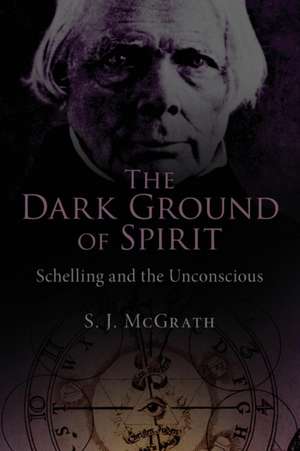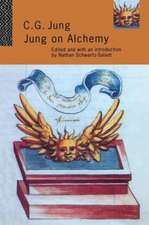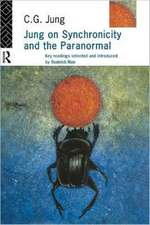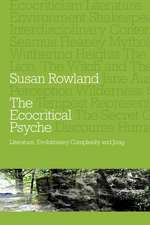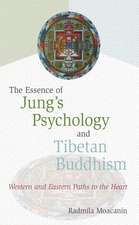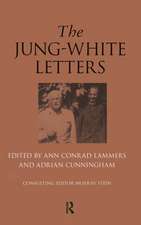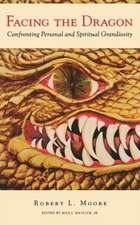The Dark Ground of Spirit: Schelling and the Unconscious
Autor S. J. McGrathen Limba Engleză Paperback – 2 feb 2012
McGrath shows how the unconscious originally functioned in Schelling's philosophy as a bridge between nature and spirit. Before Freud revised the concept to fit his psychopathology, the unconscious was understood largely along Schellingian lines as primarily a source of creative power. Schelling's life-long effort to understand intuitive and non-reflective forms of intelligence in nature, humankind and the divine has been revitalised by Jungians, as well as by archetypal and trans-personal psychologists. With the new interest in the unconscious today, Schelling's ideas have never been more relevant.
The Dark Ground of Spirit will therefore be essential reading for those involved in psychoanalysis, analytical psychology and philosophy, as well as anyone with an interest in the history of ideas.
| Toate formatele și edițiile | Preț | Express |
|---|---|---|
| Paperback (1) | 386.00 lei 6-8 săpt. | |
| Taylor & Francis – 2 feb 2012 | 386.00 lei 6-8 săpt. | |
| Hardback (1) | 1286.84 lei 6-8 săpt. | |
| Taylor & Francis – 2 feb 2012 | 1286.84 lei 6-8 săpt. |
Preț: 386.00 lei
Nou
Puncte Express: 579
Preț estimativ în valută:
73.86€ • 77.12$ • 61.13£
73.86€ • 77.12$ • 61.13£
Carte tipărită la comandă
Livrare economică 04-18 aprilie
Preluare comenzi: 021 569.72.76
Specificații
ISBN-13: 9780415492126
ISBN-10: 0415492122
Pagini: 232
Ilustrații: 2 black & white illustrations, 3 black & white line drawings
Dimensiuni: 156 x 234 x 15 mm
Greutate: 0.06 kg
Ediția:1
Editura: Taylor & Francis
Colecția Routledge
Locul publicării:Oxford, United Kingdom
ISBN-10: 0415492122
Pagini: 232
Ilustrații: 2 black & white illustrations, 3 black & white line drawings
Dimensiuni: 156 x 234 x 15 mm
Greutate: 0.06 kg
Ediția:1
Editura: Taylor & Francis
Colecția Routledge
Locul publicării:Oxford, United Kingdom
Public țintă
Postgraduate, Professional, and Professional Practice & DevelopmentCuprins
Introduction. Tending the Dark Fire: The Boehmian Notion of Drive. The Night-side of Nature: The Early Schellingian Unconscious. The Speculative Psychology of Dissociation: The Later Schellingian Unconscious. Schellingian Libido Theory. Appendix: The Metaphysical Foundations of Schellingian Psychology.
Notă biografică
S.J. McGrath is an associate professor of philosophy at Memorial University of Newfoundland, Canada. His areas of specialisation include phenomenology, German philosophy and the philosophy of religion.
Recenzii
"Rarely has Schelling been written about with such clarity and passion: McGrath's careful research clinches the argument that the theosophical tradition of Boehme as received by Schellingian philosophy constitutes the root of the unconscious." - Paul Bishop, University of Glasgow, UK
"This book deals with Schelling's theory of the unconscious and examines its complex, critical relations to psychoanalysis and psychology, showing that it constitutes a theory of mental health, an entire psychology, which stands on its own. Moreover, it demonstrates the centrality not only of theology but also of the esoteric tradition in Schelling's philosophy, and carefully traces the development of his thought in that essential context." - Professor James Bradley, Memorial University, Newfoundland, Canada
"McGrath's The Dark Ground of Spirit is among the most imaginative, original, at at times exhilarating, studies of Schelling to appear in recent years. Although he carefully charts the full historical trajectory, including the difficult late work on philosophical religion, of what he calls Schelling's "style" of thinking, he does so in order to carefully unpack the problem of the unconsciousness. This allows him to make a powerful case for a uniquely Schellingian style of psychoanalysis. McGrath's pursuit of what Schelling's student Schubert felicitously dubbed the 'night-side of nature" performs a delicate bi-directional hermeneutic. On the one hand, McGrath contextualizes the work of Schelling in relationship to Boehme, Baader, and other indispensable thinkers, giving us a fuller sense of Schelling's fundamental philosophical impulse. On the other hand, this is an expansive work of 'hermeneutical refraction,' carrying Schelling's 'thought forward into contexts that it does not and cannot anticipate.' Contrasting Schelling with Freud, Jung, and Lacan, McGrath discovers a 'theory of the libido in its own right." - Jason Wirth, Seattle University, Washington, USA
"This book deals with Schelling's theory of the unconscious and examines its complex, critical relations to psychoanalysis and psychology, showing that it constitutes a theory of mental health, an entire psychology, which stands on its own. Moreover, it demonstrates the centrality not only of theology but also of the esoteric tradition in Schelling's philosophy, and carefully traces the development of his thought in that essential context." - Professor James Bradley, Memorial University, Newfoundland, Canada
"McGrath's The Dark Ground of Spirit is among the most imaginative, original, at at times exhilarating, studies of Schelling to appear in recent years. Although he carefully charts the full historical trajectory, including the difficult late work on philosophical religion, of what he calls Schelling's "style" of thinking, he does so in order to carefully unpack the problem of the unconsciousness. This allows him to make a powerful case for a uniquely Schellingian style of psychoanalysis. McGrath's pursuit of what Schelling's student Schubert felicitously dubbed the 'night-side of nature" performs a delicate bi-directional hermeneutic. On the one hand, McGrath contextualizes the work of Schelling in relationship to Boehme, Baader, and other indispensable thinkers, giving us a fuller sense of Schelling's fundamental philosophical impulse. On the other hand, this is an expansive work of 'hermeneutical refraction,' carrying Schelling's 'thought forward into contexts that it does not and cannot anticipate.' Contrasting Schelling with Freud, Jung, and Lacan, McGrath discovers a 'theory of the libido in its own right." - Jason Wirth, Seattle University, Washington, USA
